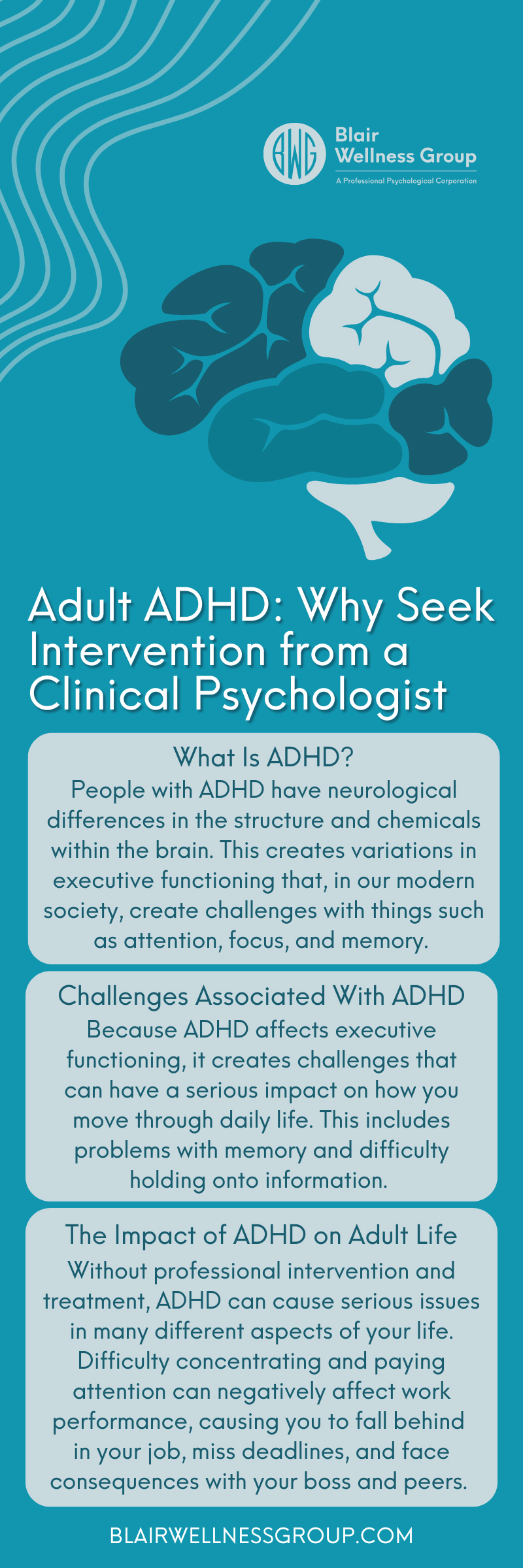As with any Mental Health Disorder, you can overcome the challenges of Attention Deficit Hyperactivity Disorder (ADHD) with the help of a Licensed Clinical Psychologist. This is easier said than done, however—especially for adults with ADHD. Seeking professional intervention and treatment takes courage and commitment. However, the benefits of working with a clinical psychologist to overcome adult ADHD are impossible to overstate. Learn more about what adult ADHD is, how it can affect your life, and why a Licensed Clinical Psychologist is the best path forward for treatment with this overview.
What Is ADHD?
ADHD is one of the most common Mental Health Conditions today. People with ADHD have neurological differences in the structure and chemicals within the brain. This creates variations in executive functioning that, in our modern society, create challenges with things such as attention, focus, and memory. Symptoms of ADHD revolve around hyperactivity, impulsivity, and inattention.
There are multiple types of ADHD that create different symptoms. As a result, everyone’s experience with ADHD is unique. These types include predominantly inattentive, predominantly hyperactive-impulsive, and combined ADHD. Predominantly inattentive ADHD is when the individual struggles more with attention span than hyperactivity or impulsivity. Predominantly hyperactive-impulsive ADHD involves more symptoms of hyperactivity and impulsivity than inattention. With combined ADHD, the individual experiences both types of symptoms.
Challenges Associated With ADHD
Because ADHD affects executive functioning, it creates challenges that can have a serious impact on how you move through daily life. This includes problems with memory and difficulty holding onto information. It might also affect your ability to start tasks, sustain effort, or maintain focus long enough to complete those tasks. Difficulties with memory, attention, and focus can also create problems with organization and time management.
It is important to note that there are many misconceptions about how ADHD works and where these challenges stem from. For example, attention issues are the most well-known symptom of ADHD. Many adults with ADHD struggle to concentrate on the moment at hand. This is not because of laziness or a lack of priority, however. The problem stems from ADHD’s fixation on stimulation, activation, and reward.
The issue is not that someone with ADHD is not paying attention; it is that they are paying attention to everything. Their brain notices all present stimuli in a moment and latches on to any source of activation or reward. This experience makes it hard to focus on something routine or ordinary, which can lead to difficulty concentrating and paying attention.
The Impact of ADHD on Adult Life
Without professional intervention and treatment, ADHD can cause serious issues in many different aspects of your life. Difficulty concentrating and paying attention can negatively affect work performance, causing you to fall behind in your job, miss deadlines, and face consequences with your boss and peers.
These stressors can go on to create tension in relationships—tension that is compounded by emotional dysregulation, poor distress tolerance, and other symptoms often associated with ADHD. These challenges impact your thoughts and emotions, negatively affecting your overall well-being.
Adult ADHD Is Underdiagnosed
Despite these challenges, it is often difficult for adults to receive accurate diagnoses. Part of this stems from widespread misunderstanding about ADHD. Conversations about ADHD tend to center around children, which means many people do not learn about the indicators and challenges of adult ADHD.
Social stigma also plays a role. Public opinion about ADHD and Mental Health in general is fraught with misconceptions and misinformation. There are many stereotypes and other misunderstandings, such as the unfair criticism that people with ADHD are simply too lazy or apathetic to care about their work or relationships. Symptoms of ADHD can also mimic many symptoms of depression, anxiety, PTSD, and other Mental Health Disorders. This is why it is crucial to seek intervention, including a proper diagnosis and a relevant treatment plan from a Clinical Licensed Psychologist.
Additionally, like any Mental Health Condition, ADHD is a unique experience for everyone who has it. The symptoms and challenges vary from person to person. The nature of this condition makes it hard to clearly and accurately identify the signs of adult ADHD in your life.
Why See a Licensed Clinical Psychologist?
When you work with a Licensed Clinical Psychologist to treat your adult ADHD, you work with someone who can look at the challenges in your life and help you understand where they come from. Your clinical psychologist will help show you how your ADHD influences your life and how you can address it at the root to create positive, lasting change.
During your professional meetings with a Licensed Clinical Psychologist, you will pursue evidence-based treatments such as Cognitive Behavioral Therapy (CBT). You will also identify and address any Mental Health Disorders comorbid to your ADHD.
Cognitive Behavioral Therapy and Adult ADHD
Cognitive Behavioral Therapy, among many other evidence-based treatment models, is a common and effective form of treatment for adult ADHD. It builds self-awareness, making it easier to identify negative behaviors or habits and replace them with positive alternatives. Cognitive Behavioral Therapy also helps patients gain greater control over thought patterns, emotional reactions, and behaviors.
With greater understanding and control comes the cognitive tools you need to handle and overcome the challenges of ADHD. Understanding how ADHD affects the way you go through your day allows you to identify and correct negative behaviors instead of just living with their consequences.
Licensed Clinical Psychologists incorporate Cognitive Behavioral Therapy and other modalities of evidence-based therapies into the treatment plans, helping patients develop the knowledge and skills necessary to handle the challenges of adult ADHD.
Identifying and Addressing Comorbidities
There are many comorbid Mental Health Conditions that arise alongside ADHD. Anxiety Disorders are a common comorbidity that often stem from the pressure, shame, and stress associated with ADHD in adults. Mood Disorders such as Depressive Disorders are also common in adults with ADHD. These comorbidities can blur the lines between symptoms and make it difficult to accurately identify how certain Mental Health Conditions affect your life.
A skilled, knowledgeable, and seasoned Licensed Clinical Psychologist can identify not just the effects of ADHD but also the presence and effects of any other Mental Health Disorder. With this knowledge, they will build an individualized treatment plan that factors in the unique challenges and experiences you face while working toward your personal needs and goals.
If you are looking for ADHD Treatment from a Licensed Clinical Psychologist or Therapist, contact Blair Wellness Group to see how an evidence-based treatment plan from a Licensed Clinical Psychologist can help you.

Dr. Cassidy Blair is a renowned Licensed Clinical Psychologist and trusted Performance Coach who specializes in providing Concierge-Psychological Care and Executive Coaching for high-achieving professionals. With a deep understanding of the unique challenges faced by CEOs, executives, entrepreneurs, and leaders, Dr. Blair offers tailored, confidential care designed to foster emotional well-being, personal growth, and professional excellence. Her clientele values her discretion, clinical expertise, and emotionally intelligent approach to navigating complex personal and professional dynamics.
- This author does not have any more posts.








